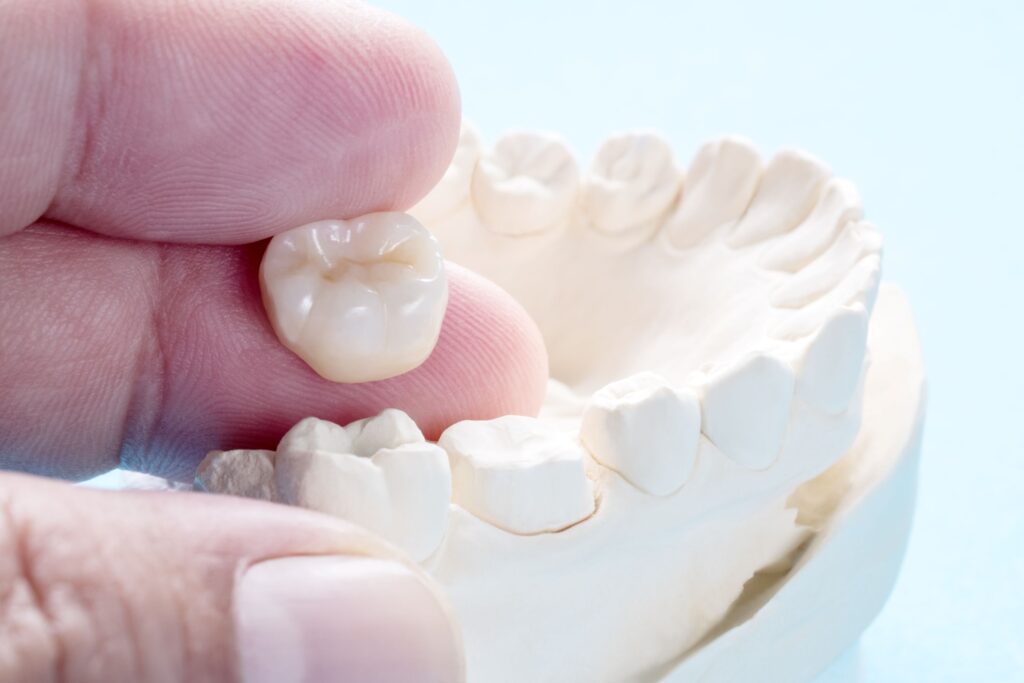Dental crowns are a popular treatment because they can preserve your natural teeth in circumstances that might otherwise require extraction. For example, if you have a severely decayed or damaged tooth or recently had a root canal, your dentist can place a tooth-shaped cap to shield it from further harm while allowing you to continue using it normally.
Some patients worry that getting dental crowns involves a long and agonizing recovery period, but that’s thankfully not the case! Continue reading to learn 3 helpful hints that can help you heal effectively after being fitted with your restoration!
Tip #1: Address Aches
Did you know that a small amount of enamel must be removed for your dental crown to fit correctly? This is the only way to ensure it will fit correctly over your troublesome tooth without appearing overly bulky or awkward. Thinning the protective outer layer can cause some tenderness and sensitivity for a little while, but fortunately, these symptoms are temporary and usually resolve themselves after a few days to a couple of weeks.
However, that doesn’t mean you have to live with the discomfort in the meantime. It’s usually safe to take ibuprofen or Tylenol to reduce associated aches or inflammation. You might also try applying a numbing oral gel to your sore tooth for a temporary numbing sensation.
Tip #2: Eat Carefully
If you’re already hurting, you don’t want to eat anything that might exacerbate your condition. Overly hard or crunchy foods that are difficult to bite into or chew can trigger a painful reaction, so you may want to avoid them for a few days. Also, overly sticky or sugary foods can yank your restoration out of place or erode the underlying tooth, so it’s best to minimize your consumption.
You might want to stick to softer foods that are easier on your mouth, like applesauce, mashed potatoes, scrambled eggs, soft noodles, yogurt, or pudding.
Tip #3: Clean Your Mouth
Your mouth is full of bacteria eagerly awaiting an opportunity to infiltrate your teeth and gums to cause decay and disease, especially after a major procedure like getting a dental crown. Your prosthetic can’t get cavities, but the tooth beneath it is still vulnerable. If it’s damaged, your crown won’t have enough healthy material to keep it cemented in place.
If you’re too sore to brush and floss the same day as your procedure, you can rinse with warm salt water to gently cleanse and disinfect your mouth. Then, you can resume your regular twice-daily dental hygiene routine whenever you feel better or your dentist gives you the green light.
Most people have fully recovered after a few days to about a week. If you experience ongoing or severe aches or inflammation for two or more weeks, contact your dentist so they can check the fit of your dental crown.
Meet the Author
Dr. Sam Antoon has 30+ years of experience helping families build and maintain their healthiest, most beautiful smiles. He earned his dental doctorate from the Southern Illinois University’s School of Dental Medicine and is a valued member of several prestigious organizations, including the American Dental Association. He offers a comprehensive menu of services at one convenient location to meet all your needs, including dental crowns. He combines a compassionate approach with state-of-the-art equipment to provide lifelike restorations intended to last. You can request an appointment on the website or by calling (972) 640-6229.

